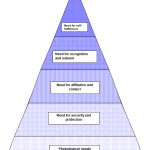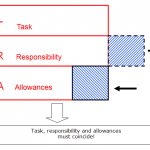Was macht uns im Beruf glücklich?
Früher hieß es: „Wie lange musst Du noch arbeiten?“ Heute müssen wir fragen: „Wie lange dürfen und können wir arbeiten?“ Denn die, die arbeiten, sind gesünder, zufriedener und sind länger fit und offen. Umso wichtiger ist deshalb die Frage: welche Faktoren machen in der Arbeit glücklich?
Category Archives: Unternehmer im Unternehmen
Reportinggespräch und Reportingchart – Strukturierungshilfe für Mitarbeitergespräche
In der Interaktion zwischen Mitarbeiter und Führungskraft sind die Zwischengespräche alle sechs bis zwölf Wochen unter vier Augen eines der wichtigsten Mittel. Das Reportingchart hilft bei der Strukturierung der Gespräche.
Arbeitszufriedenheit als Führungsaufgabe
Arbeitszufriedenheit als Führungsaufgabe
Unternehmen achten bei der Auswahl von Führungskräften immer stärker auf soft skills.
Performance Management Puzzle
Performance Management – Wie ich dafür sorge, dass meine Mitarbeiter erfolgreich sind.
„Wir könnten bei guter Führung doppelt so produktiv sein!“
"Wir könnten bei guter Führung doppelt so produktiv sein!"
Die Mehrheit der befragten Mitarbeiter einer weltweiten Studie ist der Meinung, dass sie doppelt so gut sein könnten, wenn die Führung stimmt.
advising, supporting and developing staff
A major task for any manager is the support of their staff. One thing which has an effect here is professional development since staff members have tasks which they must work on appropriate to their knowledge and skills and which at the same time constantly enable them to learn new things: "Job […]
Maslow´s hierarchy of needs
Maslow assumes that human behaviour is based on five fundamental needs: – need for self-fulfillment – need for esteem and recognition (self-respect and respect from others) – need for affiliation and love (social needs) – need for security (protection needs) – physiological needs (hunger, thirst etc.) Maslow acts on the assumption that these needs […]
basic agreement
A shared understanding of the basic tasks, responsibilities and decision-making authority is the basis of any organised work and the stabilising foundation of any cooperation. Because they form the basis of our basic understanding of our work, deficiencies in the basic agreement almost always lead to injuries on the relationship level and of course to […]
motivation
1. The term "motivation" The word "motivation" comes from the Latin "motivus", meaning to trigger movement. Motivation refers to internal processes (driving forces, needs, attitudes, interests, will) which cause a person to display certain behaviours more often, for longer, more intensively or in a more targeted way (according to Fröhlich & Drever, 1983). Human […]
delegation
Preparatory questions for staff with management responsibility Eight W-rules for delegation: 1. What needs to be done (content)? What are the individual tasks to be achieved? What is the desired result? What are acceptable differences from the desired result? What difficulties can be expected? […]






